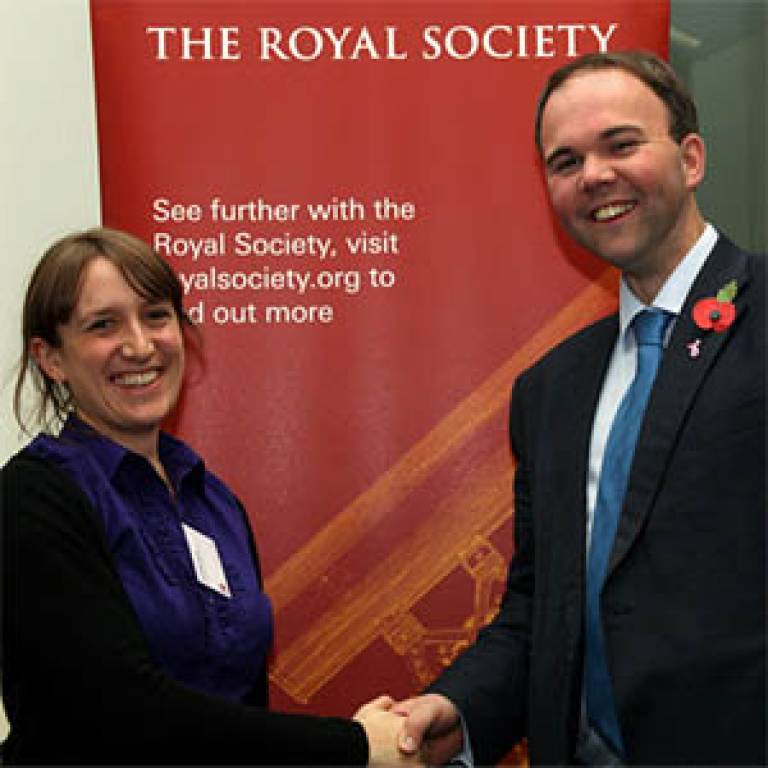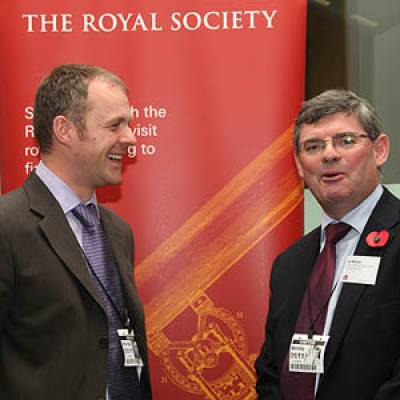UCL scientists' week in Westminster
13 December 2010
Three UCL researchers report on their week in Westminster, the first part of a
 org/General_WF.aspx?pageid=7277&terms=mp+pairing+scheme" target="_self">Royal Society scheme to build bridges between parliamentarians, civil servants and
some of the best science research workers in the UK.
org/General_WF.aspx?pageid=7277&terms=mp+pairing+scheme" target="_self">Royal Society scheme to build bridges between parliamentarians, civil servants and
some of the best science research workers in the UK.
Dr Emily Nurse (UCL Physics & Astronomy), Dr Craig Childs (UCL Civil, Environmental and Geomatic Engineering) and Dr Chris Arridge (UCL Mullard Space Science Laboratory) each won the opportunity to shadow an MP or civil servant, to see for themselves how science informs government policy. Here they lay bare their eye-opening experiences, and why they have changed their opinions of the government.
Dr Emily Nurse: Five things I learnt when shadowing an MP
"I was paired with Gavin Barwell, the new Conservative MP for Croydon Central. Five things I learnt during my week in Westminster:
1. There are a lot of scientific governmental and parliamentary bodies!
The ones we learnt about include: Chief Scientific Advisers Committee; Science Advisory Councils and Committees; Council for Science and Technology; Science and Engineering Advice in Emergencies (SAGE); Science and Engineering Assurance programme (SEA); Foresight Projects; Foresight Horizon scanning; the House of Commons and House of Lords Select Committees; House of Commons Library; The Parliamentary Office of Science and Technology (POST)... etc! Wow… and, to be honest, Iʼm still very hazy on the subtle differences between them all.
2. The Science and Technology Select Committees really do look into how well government deals with scientific issues
I sat in on one of their meetings dealing with an enquiry into 'scientific advice and evidence in emergencies' where they discussed how well prepared the government was in the volcanic ash crisis; whether decisions were evidence based; etc. Whatʼs more, I learnt that it is possible for scientists to influence these enquiries by responding to calls for evidence or even making suggestions for enquiry topics. Good to know.
3. House of Commons debates are not always the bravado show often seen during Prime Minister's Questions [PMQs] on TV
I sat in on PMQs whilst I was there, and yes it did feel like I could be in the Eton debating society, but I also popped into the viewing gallery on a couple of other occasions, and it was much more civilised and serious. Debate topics ranged from whether voting forms should contain "fill in black ink"(donʼt they have designers for these things?) to the Saville inquiry into Bloody Sunday.
4. MPs work incredibly hard and are effectively doing two jobs with very different skill sets
I thought I worked long hours, but Gavin tells me he often starts the
day at 6am and gets back home after 11 pm. Most of the time they are in Westminster: debating,
voting, attending meetings and events. But they also have another full-time job - looking after
their constituency. I spent one day shadowing Gavin in Croydon.
During the day we met with local firemen to hear their side of the story on the scheduled strike on Bonfire Night weekend; heard the worries of local newsagents about a proposal for cigarette displays to be kept out of sight; touched base with the new management at the local paper, for which Gavin writes a weekly column; met with the Chief Executive Officer of Nestle (Croydonʼs biggest employer); canvassed one of the local streets; then finally attended a meeting with the charitable organisation that runs Gavinʼs old school.
I also know that Gavin and his case workers spend hours dealing with requests for help on personal issues. It is clear this is one of the parts of the job he loves the most, and that he has huge pride of and devotion to his constituency.
5. Some politicians really do see the value in science
In the recent spending review the science budget was protected, in flat cash terms at least. It seems the government ring-fenced the budget in a realisation of the important role science plays in the economic growth of our country. I asked Gavin if politicians also valued the bigger picture; that science is not just about short-term economic gain but about advancing humanity on a global and very long-term scale. Gavin certainly gets this, and I think some other politicians do too. During the week Gavinʼs colleague Nicola Blackwood MP for Oxford West and Abingdon managed to secure a Westminster Hall debate on Science Research (full debate transcript), in general it was extremely positive for science."
Craig Childs: "I am more confident that Parliament rigorously examines how we deal with given situations"

"I heard that the Royal Society arrange a scheme where academics (so
called 'young' scientists) interact with the public face of how parliament
works (MPs) and the people who actually get things done (civil servants).
If
this event had consisted of an afternoon in a lecture hall with presentations
and discussions that would have been great; but oh no, this scheme is so much
better than that. Being a naturally nosy person I had to apply. Result: I was
selected! Not only was I selected for the scheme, but I was to be paired with a
civil servant working on the build aspect of the London 2012 Olympic Games: Ian
Williams.
The week
started off with a tour of the Houses of Parliament; a bit of historical
context. Then we had some presentations from different organisations within or
linked with Parliament regarding science and how it is used in policy and
parliamentary decision-making. The Parliamentary Office of Science and
Technology, the Foresight programme, the Science and Technology Select
Committees of the Commons and the Lords, and the Parliamentary Library. Each
presentation from each organisation seemed clear enough, but on reflection, why
do we need so many different organisations? Given that most of them are
complementary, would it not be better to combine them; sharing resources? At
least we got the impression that there is good communication between them, so
there isn't duplication of effort. After observing the Commons Select Committee
session on Scientific Advice and Evidence in Emergencies, I am more confident
that Parliament rigorously examines how we deal with given situations to help
us mitigate the effects of future occurrences.
This is where the group sessions ended and the actual pairing time began. The next two days were a bit like an extended job interview: being introduced to many people, and trying to remember their names, responsibilities, and how they fit into the ever-changing structure of organisations that are responsible for making the London 2012 Olympic Games a success. From an accessible transport perspective it was reassuring to know how much effort is being put into the infrastructure, transport modes and information systems to help make it possible for people who are interested to get to and enjoy the games regardless of their disability.
Still to come - we are arranging for me to visit the Olympic site to see the development for myself; then Ian and some of his colleagues will visit PAMELA, our Pedestrian Accessibility and Movement Environment Laboratory, to experience what we do there."
Chris Arridge: "My perspective on government and the civil service has completely changed"
"I am in the UCL Department of Space and Climate Physics known as Mullard Space Science Laboratory (MSSL) based in the Surrey Hills near Guildford. Currently I'm a postdoctoral fellow funded by the Science & Technologies Facilities Council, studying data from NASA's Cassini mission to Saturn.
I applied for the Royal Society pairing scheme because, although I've been involved in public engagement for about five years, I had not yet had the opportunity to engage with policymakers, civil servants or parliamentarians. As an early career researcher I hear lots about spending reviews and research council budgets, but it was never clear to me how I could get involved to positively influence these activities.
The sad loss of particular research groups, departments and fields of scientific study in the UK has made me realise that my future career in science depends on selling science to government. Ultimately, in the decades to come, this is dependent on the ability of myself and my peers to influence research council budgets and the Comprehensive Spending Review, and to help the research councils and the UK Department for Business, Innovation and Skills (BIS) sell science to the Treasury. I applied for the Royal Society scheme to start down the road of learning how to do those things.
The week in Parliament started with a couple of days of seminars and
workshops including tours of both Houses. It was interesting to hear how the
rituals carried out in the Parliament are steeped in the history of our
political system. I was also struck by how many different organisations and
lobby groups are present in government to push the Science, Technology,
Engineering and Mathematics (STEM) agenda.
The prevalence of acronyms also surprised me and rivalled that of NASA or ESA (European Space Agency) who are infamous for their use of acronyms! I'm now comfortable with PMQs, HoC (House of Commons), SIN (Science and Innovation Network), TSB (Technology Strategy Board), GCSA (Government Chief Scientific Adviser) and many more. These sessions finished around 4pm on Tuesday and I visited the public viewing gallery in the House of Commons. Even though it was relatively empty, it was still interesting to see it in the flesh. We were also fortunate to be able to attend a session of the House of Commons Select Committee on Science and Technology which was a real eye-opener into the flow of evidence-based advice and how rigorously this is checked.
I was paired with Vicky Elliott who is head of Bilateral Science and Innovation Policy in the International Science and Innovation Unit in BIS. We had the opportunity to meet at UCL before the week in Parliament and found out a bit about each other's jobs, and worked out a plan for the two days I would spend in BIS. Vicky arranged a number of sessions with key people in BIS who are involved in international science, the spending review, and science in society. Having worked in an international company in the past I was surprised how familiar BIS felt. I was also surprised by how strongly the civil service had been hit by the spending review and I'm not sure that is always fully appreciated by academia.
My perspective on government and the civil service has completely changed and I'm glad I participated in the programme. I look forward to welcoming Vicky to MSSL in January for us to complete the other half of the pairing scheme. I have also gained some useful links for the future that are already proving to be beneficial for both myself and BIS."
Images from top: Dr Emily Nurse with Gavin Barwell MP; Dr Craig Childs (left) with civil servant Ian Williams
 Close
Close

